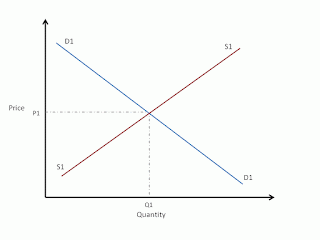It's a case of basic, rudimentary economics straight out of "Econ 101". The law completely ignores the laws of supply and demand. Supply and Demand analysis at a level that can be taught to a 6th grader can demonstrate how and why very simply.
One principle of Demand -- the more people want it, the more they are willing to pay for it, the higher the market price.
One principle of Supply -- There is a finite amount available. Decrease that supply, and the per item value increases due to less availability.
Before going into the application to Obamacare, let's take a look at a real world occurrence.
While serving in the US Army infantry, we would go "to the field" for a week or two at a time. Often, we'd be away from anyplace we could buy sundry and "luxury" items.
Our packs could fit only so much. We had to pack mandatory gear. The remaining room was left for personal items, such as a book or cigarettes.
By the end of the exercise, many smokers would be low or out. However, they would have their stock at the beginning.
During the middle, somebody who ran out would be willing to pay $2 for a pack of generics, $5 for premiums. This was when a pack of premiums went for $3 at the store. Generics were less than $1 a pack.
The second to last day (or the morning of the last day) most people were out. Those of us who sacrificed packing other "creature comforts" to afford space for an extra carton of smokes could sell those generics for $5-$10 a pack. I was even able to sell a single cancer-stick for $1.
The supply shrank. The price went up.
The demand remained somewhat constant. There were smokers who needed to meet their addictions. There were also "field smokers" who would dabble in a cig or two a day while in the field, but didn't smoke otherwise. Due to stress, and boredom, many of them were hooked by the end of the exercise. Their perceived need had increased to 5 -10 a day (from 1 or two). Demand rose (number of smokers). So did the market price.
So, let's look at how this affects healthcare.
Can we agree that medical and health insurance (and affiliated plans) affect the overall cost of health care?
Well, even if you disagree, they do.
So, now you flood the market with demand. The PPACA mandates (or will come January 2014) that everybody be insured by some manner or other. Employers will also be forced to acquire healthcare benefits for employees.
The market will be flooded with customers. That increases demand. It also steepens the slope of the curve.
This will not be temporary, either. The demand will continue to increase as the population grows.
That pushes up the amount the market is willing to spend/pay on the demand side.
We can also agree that the prices of certain tests, procedures, and other incidentals affect the cost of health care.
This is where the supply curve is affected.
Obamacare seeks to restrict those tests and procedures. It will do so by refusing to pay for many of them, deeming them unnecessary and elective. Many of them are. Some will pay extra for plans that will cover them (or have lower deductibles). Those will be premium plans, though. Most people who do end up seeking these portions of care will end up vying for means of getting the tests outside of the government system. Those will be in limited supply. The providers of them will be willing/able to supply them, but the price they will make them available will increase. The supply, in effect, shrinks, causing, again, the market price to rise.
Apply both the supply and demand sides of the market-price analysis and the laws of supply and demand determine that the costs of both insurance and care cannot help but go up.
Should the "Big-G" come along and attempt to regulate the pricing, the supply will shrink more, as those providing the products will stop producing (or giving service). Those demanding, but stuck in long waiting lists will seek "black market" options. Again, the overall market price rises even more, because those providing will be assuming more risk.




No comments:
Post a Comment
Note: Only a member of this blog may post a comment.